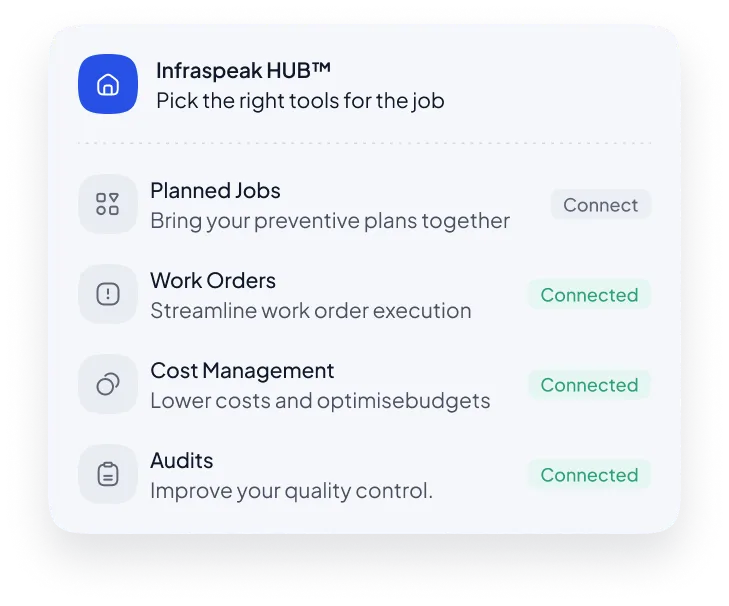What is compliance in Facility Management?
Compliance is “to be in accordance” with a certain plan, regulation, legislation, or standard. Therefore, compliance in Facility Management implies complying with a certain task plan, safety regulations, the legislation of the country, or ISO standards.
But this definition is very generic! To ensure compliance in maintenance and FM, the manager must familiarise himself with the objectives of each company and the country’s regulations. In addition, as outsourcing is extremely common in FM, supplier compliance management must also be done.
Compliance formula in preventive maintenance
Compliance in preventive maintenance is the ratio between tasks completed and those planned. For example, if there are 60 tasks planned for a month and only 50 are performed, the compliance calculation will be:

How important is compliance in Facility Management?
Over the lifetime of a building, annual operation and maintenance expenses vary between 1-2% of the initial cost. If we consider a 40-year lifetime, the maintenance of the building can be up to 80% of the initial cost. After 50 years, the maintenance cost can even be equivalent to the construction cost. So, there is a tendency to see FM as a “cost”.
However, maintenance, FM, and building management are essential if the infrastructure is to continue to meet expectations, needs, and legal requirements. See some examples of how important it is to ensure supplier compliance and preventive maintenance compliance:
- comply with standards that apply to your business area, namely HACCP plans, fire regulations, and other applicable legislation;
- make sure that the building’s Centralised Technical Management (CTM), or Building Automation and Control Systems, follow the requirements stipulated by law (UK legislation here)
- comply with health and safety standards, especially with regard to disease prevention (e.g. Legionella) and Indoor Air Quality (IAQ)
- guarantee data privacy, as FM suppliers must ensure the confidentiality of all information to which they have access;
- in the event of an accident, demonstrating your suppliers’ compliance with all recommended standards prevents the insurer shifting the onus onto your company.
So, maintenance and FM compliance not only improves your business performance, but it also saves you money on fines! As such, in the long run, there is no doubt that having compliant suppliers is very beneficial for your company. But beware: set all the standards to be met in an SLA (Service Level Agreement) to avoid unpleasantness.
On the other hand, if you are a service provider, demonstrating compliance with maintenance plans should be a priority. You should always think, “am I achieving compliance? How can I prove it to the customer?”. With smart maintenance software, technicians can record information easily and can generate automatic reports.
What are the key areas of compliance in Facility Management?
As we explained above, compliance applies to any matter that falls within the FM sphere. As such, it can include building compliance management (which concerns the life cycle of the building, e.g., asbestos removal), safety protocols, HVAC maintenance, and so on. However, they almost always fall into these 8 areas:
- Legislation (e.g., air quality legislation);
- Requirements (e.g., using approved materials)
- Rules (e.g., use of personal protective equipment);
- Standards (e.g., ISO standards, OSHA standards)
- Policies (e.g., comply with the company’s environmental policy)
- Transparency (e.g., reporting to the customer)
- Regulations (e.g., do periodic inspections);
- Governance (e.g., not stipulating an ethical code).
In recent years, the challenge of ensuring privacy of the data collected has also emerged. In 2021, a Honeywell study found that 27% of facility managers experienced cybersecurity issues, which violates data protection rights.
So, if you are a supplier, you should ensure your software is protected. If you hire or outsource, you should confirm that the supplier and IoT devices follow GDPR or ISO 27001 (Information Security Management Systems).
In addition to data privacy, JLL considers that the biggest risks of non-compliance in Facility Management focus on the following areas:
- Safety (keeping equipment operating to standard);
- Manpower (ensuring everyone has the right knowledge);
- Supplier management (from both a financial and ethical perspective);
- Data (demonstrate compliance through reporting);
- Contracts (keeping all legal documentation and supplier agreements);
- Ethics (e.g., taking responsibility for your mistakes, refusing “offers”).
How to improve compliance in Maintenance and Facility Management
Ideally, compliance in preventive maintenance is around 90%. If your compliance is below this threshold, the first step is to detect where the non-compliances are. On the Infraspeak platform, you can easily find non-compliances using the Audits app.
When you detect a non-conformity, the first step is to contain the damage: reactive maintenance. Only after you have a solution — even if it is temporary — can you move on to the next step. Applying a root cause analysis (for example, a simple 5 why analysis) allows you to find the source of the non-compliance and prevent it from happening again.
Our advice is to look at compliance cyclically. Start by defining the event: what, who, when, and where it failed. Next, look at the performance indicators and do an analysis until you discover the cause. Try to correct the “root” problem and continue to monitor over time. And so on because the world of maintenance never stops.
Want to improve your Facility Management compliance? Would you like to offer more transparency to your customers? Schedule a demo and see what an intelligent maintenance management platform can do for you.
- Eliminate potential safety hazards.
- Improve SLA completion rate by up to 91%.
- 100% compliance with regulations for maintenance operations.


